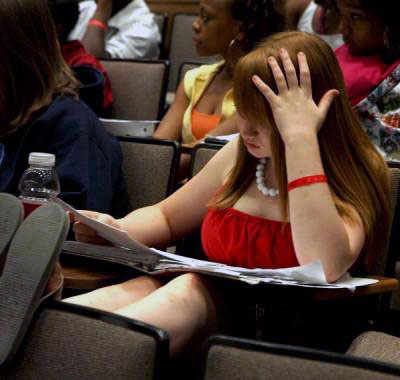All Nonfiction
- Bullying
- Books
- Academic
- Author Interviews
- Celebrity interviews
- College Articles
- College Essays
- Educator of the Year
- Heroes
- Interviews
- Memoir
- Personal Experience
- Sports
- Travel & Culture
All Opinions
- Bullying
- Current Events / Politics
- Discrimination
- Drugs / Alcohol / Smoking
- Entertainment / Celebrities
- Environment
- Love / Relationships
- Movies / Music / TV
- Pop Culture / Trends
- School / College
- Social Issues / Civics
- Spirituality / Religion
- Sports / Hobbies
All Hot Topics
- Bullying
- Community Service
- Environment
- Health
- Letters to the Editor
- Pride & Prejudice
- What Matters
- Back
Summer Guide
- Program Links
- Program Reviews
- Back
College Guide
- College Links
- College Reviews
- College Essays
- College Articles
- Back
SAT Versus Students
High school seniors don't experience severe testing anxiety from the SAT and ACT like previously thought.
A study conducted by Erika (cq) Genova shows that high school seniors don’t experience abnormal amounts of stress when confronted with SAT/ACT testing. According to Genova, testing anxiety is “the condition of intense agitation, apprehension, tension, fear or worry, occurring from a real or intuited threat of imminent danger.” Some symptoms of testing anxiety include an increased heart rate, trembling, hyperventilation, sweating, diarrhea, and sleeping or eating disorders among other symptoms. The emphasis on earning a college education is at an all time high. Some students worry that their credentials won’t satisfy the requirements college admission committees use to grant admission. One of the many requirements includes a satisfactory SAT or ACT score. The SAT and ACT are college admission tests used to measure a student’s potential college academic success. It was originally thought that this emphasis on earing high scores caused students extreme testing anxiety. As it turns out, this perception is false for most students.
Studying for the SAT/ACT can be an exasperating time for many students. Normally, students are confronted with hours of homework every night along with other extracurricular activities like sports and volunteering. Accompany that with a large SAT/ACT prep book and it makes for a potentially stressed out student. Esther Vistoso, a parent of two college-bound boys, affirms, “My boys got extremely anxious and overwhelmed while studying for the test. Their extracurricular activities along with SAT studying really tested their stress limits.” On the other hand, another statement made by Cheryl Fidlow, one of ATC’s guidance counselors, says, “I’ve never had a student visit me with aggression or depression issues because of studying for the SAT/ACT.” Based on theses statements, students do exhibit stress, but not long-term testing anxiety symptoms. Genova stated that long-term testing anxiety symptoms include “dropping out of school, the development of mental disorders and the use of drugs and alcohol.” Testing anxiety can prove to have major consequences if it gets out of control. However, based on all of the interviews, studying for the SAT/ACT doesn’t affect a student’s ability to submit quality work. In addition, students’ behavior changes minimally around testing time. Rebello justifies this in the statement, “I notice my students come in stressed out and overwhelmed right before SAT/ACT testing, but not to the extreme. It’s a normal part of testing.”
Testing anxiety varies according to a student’s gender. Genova states, “In general, females worry more than males do, and report experiencing higher levels of stress.” Based on Genova’s report, females show a higher level of testing anxiety at all grade levels and that both genders react differently to stressful situations. In Genova’s study, out of fifty students, 67% of females have experienced high levels of academic stress as opposed to 33% of males. The main difference between genders in relation to stress is that males view a stressful situation as a challenge whist females view them as a threat. According to Genova, gender reactions to stress stem from society’s expectation placed on them. Likewise, students at different grade levels experience testing anxiety variously. For example, Genova’s study reported that females enrolled in regular classes report lower signs of stress in comparison to females enrolled in AP or honor courses. However, male students didn’t report significant changes in stress despite enrollment in various levels of courses. Furthermore, all of the interviewees stated that they didn’t observe any signs of sleep deprivation in their students, children, or themselves. Overall, despite the increasing demand on high SAT/ACT scores, high school seniors don’t experience abnormal or major amounts of stress when confronted with SAT/ACT testing.

Similar Articles
JOIN THE DISCUSSION
This article has 0 comments.
